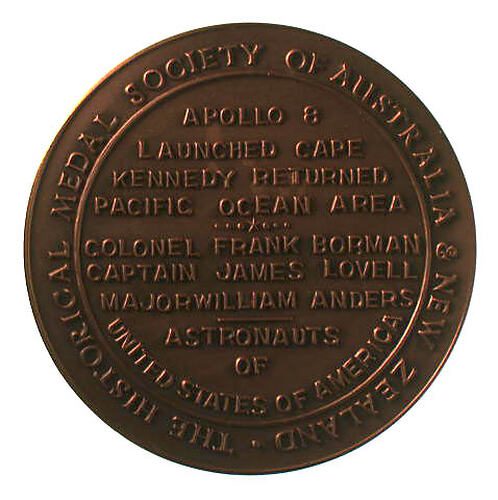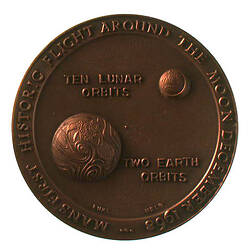Frank Borman was an astronaut, Colonel in the US Air Force, program manager, test pilot and advisor on space programs. He was born on 14 March 1928 in Gary, Indiana USA and was educated in Tucson, Arizona. He was awarded a Bachelor of Science degree from the US. Military Academy, West Point, in 1950. In 1957 he achieved a Master of Science degree in Aeronautical Engineering from the California Institute of Technology. He married Susan Bugbee of Tucson, Arizona; they had two sons.
Colonel Borman was a career Air Force officer from 1950. He served as a fighter pilot with the 44th Fighter Bomber Squadron in the Phillipine Islands in 1951-1953; an operational pilot and instructor in various squadrons in the U.S., 1953-1956; an assistant professor of thermodynamics and fluid mechanics at West Point, 1957-1960; and an experimental test pilot engaged in organizing and administering special projects for the USAF aerospace Pilot School, 1960-1962. In 1962 he joined the NASA space program.
Colonel Borman is best known as commander of the Apollo 8 space flight, the first manned lunar orbital mission in December 1968, and previously as commander of the Gemini 7 mission in 1965. In 1967, he served as a member of the Apollo 204 Fire Investigation Board and later became the Apollo program resident manager, heading the team that re-engineered the Apollo spacecraft. He also served as field director of NASA's Space Station Task Force.
In 1966 and 1968 Borman served as special presidential ambassador on trips throughout the Far East and Europe. In 1970, he undertook another special presidential mission, a worldwide tour to seek support for the release of American prisoners of war held by North Vietnam. Borman retired from the Air Force with the rank of colonel in 1970, the year he completed the Harvard Business School's Advanced Management Program and became an Eastern Airlines vice president in July of 1970. He was named senior vice president-operations group in December 1970, with responsibility for the company's engineering and maintenance, flight operations and operational coordination divisions. In July 1974 Borman was promoted to executive vice president-general operations manager and elected to Eastern's Board of Directors. The following May he was elected president and chief operating officer, and was named chief executive officer in December. A year later he became chairman of the Board.
In addition to many honorary degrees, special honors and service decorations, Borman is the recipient of the Harmon International Aviation Trophy, the Robert J. Collier Trophy and the National Geographic Society's Hubbard Medal, and the Congressional Space Medal of Honor. He also serves on the board of directors of the Air Transport Association of America.
Amongst the many commemorations of his achievements as an astronaut, in 1968 the Historical Medal Society of Australia & New Zealand issued a medal to commemorate the first manned lunar orbit flight in December 1968 (NU 23871). It named the crew: Frank Borman (commander), James A. Lovell (command module pilot and navigator) and William A. Anders (lunar module pilot).
References:
NASA website http://vesuvius.jsc.nasa.gov/er/seh/borman.htm, accessed 27 Nov 2003; http://www.jsc.nasa.gov/Bios/htmlbios/borman-f.html, accessed 14 May 2010.
More Information
-
Keywords
-
Localities
-
Authors
-
Article types

